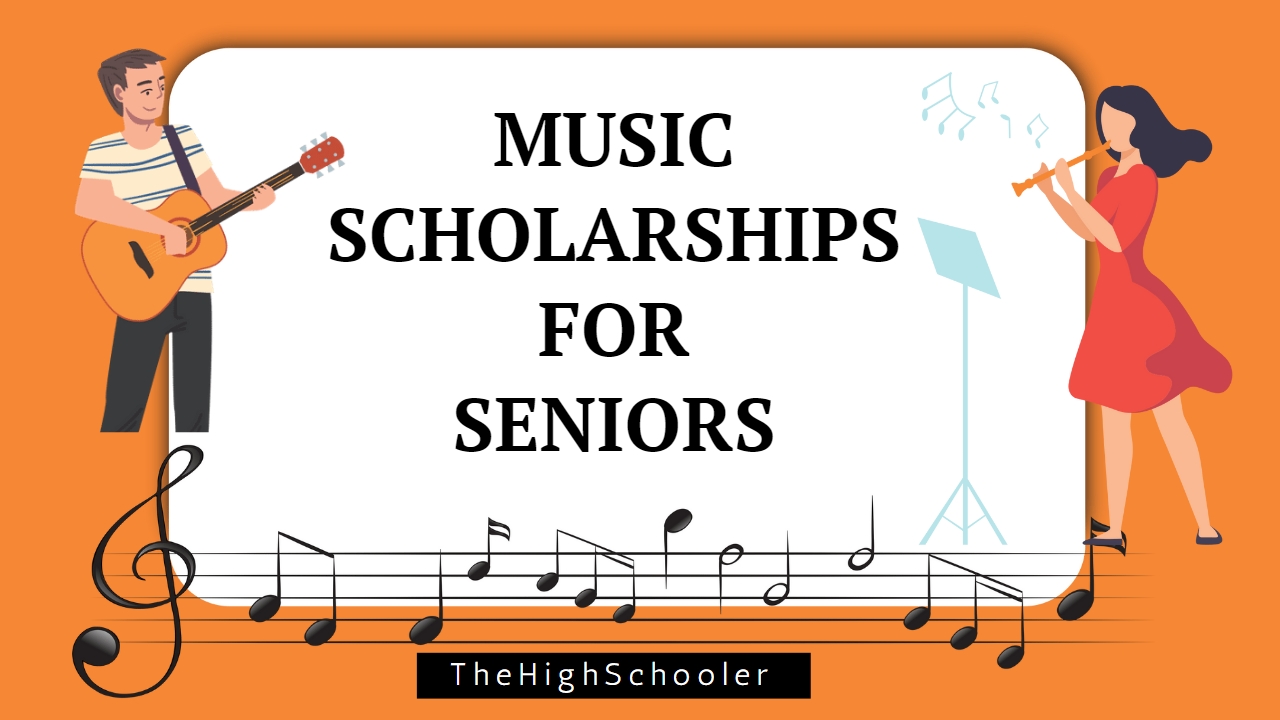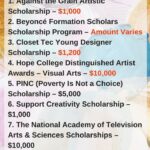
Unlocking Your Musical Dreams: A Storyteller’s Guide to Music School Scholarships
I remember it like it was yesterday, the way the late afternoon sun slanted through the window, illuminating the dust motes dancing in the air as I sat at my piano. My fingers traced the worn keys, a melody taking shape, a silent conversation between me and the instrument. But even as the notes filled the room, a familiar knot of anxiety tightened in my stomach. The dream, you see, was to go to music school. To immerse myself in that world, to learn from masters, to breathe music every single day. The reality, though, was a daunting wall of tuition fees, living expenses, and the sheer cost of chasing such a specialized passion. My family wasn’t wealthy, and the thought of accumulating a mountain of debt before I’d even truly begun felt crushing. It was a crossroads many young musicians face: the burning desire versus the cold, hard numbers.
But then, a glimmer of hope appeared, almost whispered to me by an older student during a casual chat after a community orchestra rehearsal. "Scholarships," he’d said, "that’s how many of us do it. Don’t let the price tag scare you away before you even try." Those words, simple as they were, ignited a spark. Scholarships? For music school? It felt almost too good to be true, like finding a forgotten harmony in a piece you thought you knew by heart. And so began my own deep dive into the world of music school scholarships, a journey that taught me more than just how to fill out forms; it taught me about persistence, self-belief, and the incredible generosity that exists to support budding artists.
Let me tell you, if you’re reading this, feeling that same mix of excitement and trepidation about pursuing your musical calling, know this: you are not alone, and there are pathways to make it happen. My story, and the stories of countless others I’ve met along the way, is proof that financial hurdles, while significant, don’t have to be roadblocks.
Why Do Music Schools Offer Scholarships Anyway? It’s Not Just Charity.
Before we dive into the "how," it helps to understand the "why." Music schools, conservatories, and university music departments aren’t just handing out money because they’re nice. They’re investing. They’re looking for talent, potential, and individuals who will enrich their programs and ultimately, the broader musical world.
Think about it:
- Talent Scouting: They want the best musicians, the brightest minds, the most dedicated spirits. Scholarships are a powerful incentive to attract top-tier students who might otherwise choose another institution or even a different path entirely.
- Building a Diverse Ensemble: A great orchestra needs a full complement of instruments. A vibrant jazz program needs different voices and instrumentalists. A composition department thrives on varied perspectives. Scholarships often help fill specific needs, like finding that elusive bassoonist or a strong tenor for the opera program.
- Promoting Excellence: A school’s reputation is built on its alumni. By investing in promising students, they’re nurturing future performers, educators, composers, and innovators who will carry the school’s name forward.
- Accessibility and Inclusivity: Many institutions are genuinely committed to making quality music education accessible to students from all socioeconomic backgrounds. Need-based scholarships are crucial for this mission.
- Donor Wishes: Often, scholarships are funded by generous alumni, foundations, or patrons of the arts who believe deeply in supporting the next generation of musicians. They might have specific criteria based on their passions or personal experiences.
Understanding these motivations helps you tailor your application. It’s not just about showcasing your skill; it’s about showing how you fit into their vision.
The Different Flavors of Funding: A Scholarship Buffet
When I first started researching, the sheer number of scholarship types felt overwhelming. But after a while, I began to see patterns, like different movements in a symphony. Here are the main categories, often overlapping, that I encountered:
-
Merit-Based Scholarships (The "Show Your Stuff" Awards):
These are probably what most people think of first. They’re awarded primarily based on your musical talent, your audition performance, and sometimes your academic achievements. For me, this was the big one. My piano teacher had always told me, "Your fingers can do the talking." And for these scholarships, they really do.- What they look for: Exceptional performance ability, strong sight-reading, musicality, stage presence, and potential for growth. Sometimes academic grades play a role, showing you’re a well-rounded student.
- My experience: Preparing for these auditions was intense. I spent months polishing my repertoire, recording myself, and performing for anyone who would listen. I learned that it wasn’t just about playing the notes correctly; it was about conveying emotion, telling a story through sound. One school even asked me to improvise, which truly tested my on-the-spot musical thinking.
-
Need-Based Scholarships (The "We Understand" Awards):
These are for students who demonstrate financial need. They’re designed to bridge the gap between what your family can afford and the actual cost of attendance. This was a huge relief for me, knowing that my family’s income wouldn’t automatically disqualify me from my dreams.- What they look for: Information from financial aid forms like the FAFSA (Free Application for Federal Student Aid) in the U.S., or the CSS Profile. They want a clear picture of your family’s financial situation.
- My experience: Filling out these forms felt like an entirely different kind of performance. It required gathering tax documents, understanding jargon, and being meticulously accurate. It wasn’t fun, but it was absolutely essential. Don’t skip this step! Many schools combine merit and need, offering a stronger package if you qualify for both.
-
Specific Instrument/Ensemble Scholarships (The "We Need a Tuba Player!" Awards):
Remember how I mentioned schools need a diverse ensemble? Sometimes, they have specific gaps. A school might be particularly strong in strings but need more brass players, or they might be building a new jazz combo and need a solid bassist.- What they look for: Strong proficiency on a particular instrument that the school is actively recruiting for. These can sometimes be less competitive if you play a less common instrument or one that’s in high demand.
- My experience: I had a friend who played the oboe. She wasn’t the flashiest performer, but good oboists are harder to come by, and she ended up getting a very generous scholarship because the school’s orchestra desperately needed one. It really highlighted the idea of "fit" – sometimes it’s not just about being the absolute best, but being the best for their specific needs.
-
Diversity/Minority Scholarships (The "Broadening Horizons" Awards):
These scholarships aim to support students from underrepresented backgrounds, fostering a more inclusive and representative student body. They can be based on ethnicity, gender, socioeconomic status, or other factors.- What they look for: Identification with a specific demographic group that the scholarship aims to support. Often combined with merit or need.
-
External/Private Scholarships (The "Look Beyond the School" Awards):
This category is vast and often overlooked. These scholarships aren’t directly from the music school but from outside organizations, foundations, community groups, and even individuals. This is where a lot of independent searching comes in.- What they look for: Varies wildly! Could be based on your instrument, your hometown, your academic major (e.g., music education), your volunteer work, or even a specific ethnic heritage.
- My experience: I spent hours sifting through online scholarship databases, local community foundation websites, and even asking my high school guidance counselor. I found one small scholarship from a local Rotary Club for students pursuing the arts, and another from a foundation dedicated to classical music. Every little bit truly adds up. Don’t underestimate these smaller awards; they can be easier to get and collectively make a big difference.
The Scholarship Quest: My Step-by-Step Approach (and What I Learned)
Okay, so you know what kinds of scholarships are out there. Now, how do you actually get them? This is where the real work, and the real growth, happens.
Step 1: Research, Research, Research (Know Your Target)
Before I even thought about practicing for auditions, I spent weeks researching schools. Not just the big, famous conservatories, but smaller university programs, liberal arts colleges with strong music departments, and everything in between.
- What I did: I looked at their faculty (who would I be studying with?), their program offerings (did they have what I wanted?), and crucially, their financial aid pages. Every school’s website has a dedicated section for scholarships and financial aid. I made a spreadsheet – school name, application deadlines, scholarship deadlines, required materials (audition pieces, essays, recommendations), and specific scholarship opportunities.
- My insight: Don’t just apply to one dream school. Cast a wider net. You might find a hidden gem with a fantastic program and more generous funding that perfectly suits you. And remember, scholarship deadlines are often earlier than general application deadlines, so pay close attention!
Step 2: Polish Your Craft (The Audition is Your Moment)
For most music scholarships, the audition is paramount. It’s your chance to demonstrate years of practice, dedication, and passion.
- What I did: I picked pieces that showcased my strengths but also demonstrated my versatility. My teacher advised me to choose repertoire I genuinely loved, because that passion would shine through. I practiced scales, arpeggios, and technique exercises until my fingers ached. I recorded myself constantly, listening back with a critical ear, trying to hear what the judges would hear. I even did mock auditions for friends and family, getting used to the pressure of performing under scrutiny.
- My insight: Presentation matters. Dress professionally. Be polite and confident. Listen to any instructions carefully. And breathe! Nerves are normal, but deep breaths can help you channel that energy into your performance. Most importantly, show your musicality. Play from the heart, not just from the page.
Step 3: Tell Your Story (The Power of the Personal Statement/Essay)
Beyond the notes, admissions committees want to know who you are. This is where your personal statement or essay comes in.
- What I did: I brainstormed what music meant to me. It wasn’t just a hobby; it was my language, my solace, my ambition. I wrote about a specific moment when music profoundly impacted me, connecting it to my desire to pursue it professionally. I talked about my struggles, my triumphs, and my vision for the future as a musician. I made sure to proofread meticulously and asked a trusted English teacher to review it for clarity and impact.
- My insight: Don’t just list your accomplishments. Show your passion. Tell a story. What makes you unique? What challenges have you overcome? How will a music education help you achieve your goals? Let your personality and genuine love for music shine through.
Step 4: Choose Your Champions (Letters of Recommendation)
Most scholarships will require letters of recommendation. These are crucial because they provide an objective perspective on your character, talent, and potential.
- What I did: I asked teachers who knew me well, both musically and personally – my private instructor, my high school band director, and even an academic teacher who could speak to my work ethic. I asked them well in advance of the deadline, provided them with my resume, a list of the schools I was applying to, and a brief summary of my goals. This made it easier for them to write a strong, personalized letter.
- My insight: Choose people who can speak specifically to your musical abilities, your dedication, your reliability, and your character. A generic letter won’t help you stand out. Follow up politely to ensure they’ve submitted the letters on time.
Step 5: Mind the Details (Transcripts, Resumes, and Deadlines)
While talent is king, don’t neglect the administrative side.
- What I did: I made sure my academic transcripts were sent on time, highlighting that even as I pursued music, I took my studies seriously. I crafted a detailed musical resume listing my performances, awards, ensembles, and any teaching or leadership experience. And deadlines? I had them highlighted, circled, and set reminders for every single one. Missing a deadline, even by an hour, could mean losing out on an opportunity.
- My insight: Organization is your best friend. Create a master checklist for each school and scholarship. Double-check everything before submitting. A neat, organized application speaks volumes about your attention to detail.
Beyond the Application: The Human Element
The scholarship journey isn’t just about filling out forms and playing notes. It’s also about connecting, learning, and being persistent.
- Networking (Even as a Beginner): I started attending masterclasses and open house events at schools I was interested in. This wasn’t just about showing my face; it was about learning from professors, hearing other students perform, and getting a feel for the environment. Sometimes, these interactions led to valuable advice or even a chance for a pre-audition lesson with a faculty member.
- Showing Initiative: I volunteered to play at local events, joined community ensembles, and even started teaching beginner piano lessons to neighborhood kids. This wasn’t for my resume initially, but because I loved it. However, it naturally built a portfolio of experience that demonstrated my commitment to music beyond just practicing in my room.
- Dealing with Rejection (It’s Not a "No," It’s a "Next Opportunity"): I received my fair share of "no thank yous." It stings, I won’t lie. But I learned to view it not as a personal failure, but as a redirection. Maybe that school wasn’t the right fit for me, or perhaps they simply had an abundance of pianists that year. I reminded myself that persistence is key. Every "no" brought me closer to a "yes."
- The "Fit" Factor: Sometimes, a scholarship isn’t just about being the most talented; it’s about being the right fit for the program, the faculty, and the student body. One school might prioritize classical technique, while another might be looking for a more innovative, genre-bending artist. Be authentic, and you’ll likely find a place that appreciates your unique musical voice.
The Moment of Truth and Beyond
The day I received my first acceptance letter with a significant scholarship offer felt surreal. It wasn’t just a letter; it was an affirmation. It was the universe, or perhaps a committee of dedicated music educators, saying, "We believe in you. We want you here." The relief was immense, and the gratitude even more so.
Receiving a scholarship didn’t just ease the financial burden; it fueled my motivation. It came with a sense of responsibility to make the most of the opportunity, to honor the investment others had made in my potential. It allowed me to focus wholeheartedly on my studies, to practice without the gnawing worry of debt, and to truly immerse myself in the rich world of music education.
My journey through music school was everything I had dreamed of, and more. I learned, I grew, I struggled, I triumphed. And none of it would have been possible without those vital music school scholarships.
So, if you’re out there, a young musician with a dream in your heart and perhaps a little fear in your pocket, please, don’t give up. The path to music school might seem daunting, but it’s absolutely traversable. Start your research early, practice relentlessly, tell your story honestly, and be meticulously organized. Embrace every audition as a chance to share your passion, every essay as an opportunity to articulate your vision.
The world needs your music. And there are people and institutions out there ready and willing to help you bring it to life. Believe in your talent, believe in your dream, and go chase those scholarships. Your symphony is waiting to be written.


